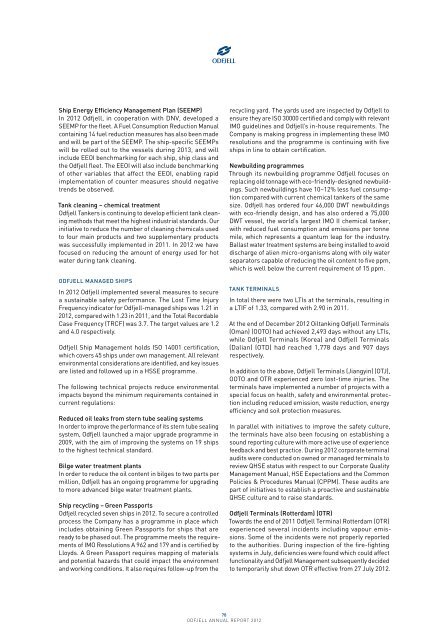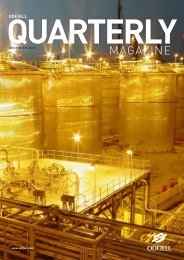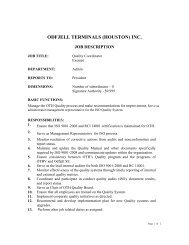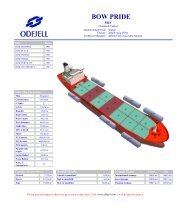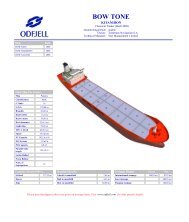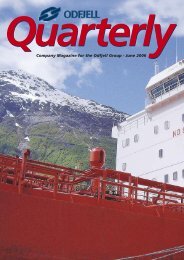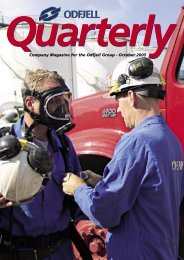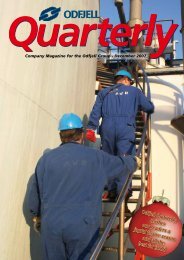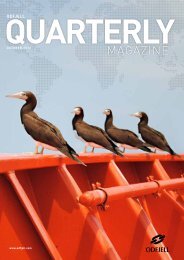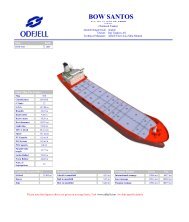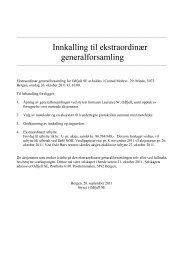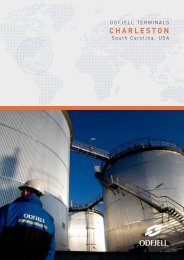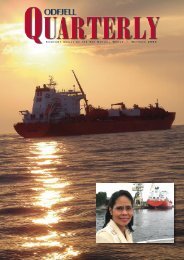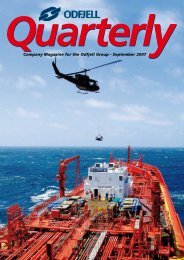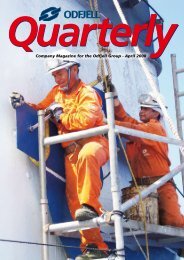Odfjell SE Annual Report 2012
Odfjell SE Annual Report 2012
Odfjell SE Annual Report 2012
Create successful ePaper yourself
Turn your PDF publications into a flip-book with our unique Google optimized e-Paper software.
Ship Energy Efficiency Management Plan (<strong>SE</strong>EMP)<br />
In <strong>2012</strong> <strong>Odfjell</strong>, in cooperation with DNV, developed a<br />
<strong>SE</strong>EMP for the fleet. A Fuel Consumption Reduction Manual<br />
containing 14 fuel reduction measures has also been made<br />
and will be part of the <strong>SE</strong>EMP. The ship-specific <strong>SE</strong>EMPs<br />
will be rolled out to the vessels during 2013, and will<br />
include EEOI benchmarking for each ship, ship class and<br />
the <strong>Odfjell</strong> fleet. The EEOI will also include benchmarking<br />
of other variables that affect the EEOI, enabling rapid<br />
implementation of counter measures should negative<br />
trends be observed.<br />
Tank cleaning – chemical treatment<br />
<strong>Odfjell</strong> Tankers is continuing to develop efficient tank cleaning<br />
methods that meet the highest industrial standards. Our<br />
initiative to reduce the number of cleaning chemicals used<br />
to four main products and two supplementary products<br />
was successfully implemented in 2011. In <strong>2012</strong> we have<br />
focused on reducing the amount of energy used for hot<br />
water during tank cleaning.<br />
ODFJELL MANAGED SHIPS<br />
In <strong>2012</strong> <strong>Odfjell</strong> implemented several measures to secure<br />
a sustainable safety performance. The Lost Time Injury<br />
Frequency indicator for <strong>Odfjell</strong>-managed ships was 1.21 in<br />
<strong>2012</strong>, compared with 1.23 in 2011, and the Total Recordable<br />
Case Frequency (TRCF) was 3.7. The target values are 1.2<br />
and 4.0 respectively.<br />
<strong>Odfjell</strong> Ship Management holds ISO 14001 certification,<br />
which covers 45 ships under own management. All relevant<br />
environmental considerations are identified, and key issues<br />
are listed and followed up in a HS<strong>SE</strong> programme.<br />
The following technical projects reduce environmental<br />
impacts beyond the minimum requirements contained in<br />
current regulations:<br />
Reduced oil leaks from stern tube sealing systems<br />
In order to improve the performance of its stern tube sealing<br />
system, <strong>Odfjell</strong> launched a major upgrade programme in<br />
2009, with the aim of improving the systems on 19 ships<br />
to the highest technical standard.<br />
Bilge water treatment plants<br />
In order to reduce the oil content in bilges to two parts per<br />
million, <strong>Odfjell</strong> has an ongoing programme for upgrading<br />
to more advanced bilge water treatment plants.<br />
Ship recycling – Green Passports<br />
<strong>Odfjell</strong> recycled seven ships in <strong>2012</strong>. To secure a controlled<br />
process the Company has a programme in place which<br />
includes obtaining Green Passports for ships that are<br />
ready to be phased out. The programme meets the requirements<br />
of IMO Resolutions A 962 and 179 and is certified by<br />
Lloyds. A Green Passport requires mapping of materials<br />
and potential hazards that could impact the environment<br />
and working conditions. It also requires follow-up from the<br />
recycling yard. The yards used are inspected by <strong>Odfjell</strong> to<br />
ensure they are ISO 30000 certified and comply with relevant<br />
IMO guidelines and <strong>Odfjell</strong>’s in-house requirements. The<br />
Company is making progress in implementing these IMO<br />
resolutions and the programme is continuing with five<br />
ships in line to obtain certification.<br />
Newbuilding programmes<br />
Through its newbuilding programme <strong>Odfjell</strong> focuses on<br />
replacing old tonnage with eco-friendly-designed newbuildings.<br />
Such newbuildings have 10–12% less fuel consumption<br />
compared with current chemical tankers of the same<br />
size. <strong>Odfjell</strong> has ordered four 46,000 DWT newbuildings<br />
with eco-friendly design, and has also ordered a 75,000<br />
DWT vessel, the world’s largest IMO II chemical tanker,<br />
with reduced fuel consumption and emissions per tonne<br />
mile, which represents a quantum leap for the industry.<br />
Ballast water treatment systems are being installed to avoid<br />
discharge of alien micro-organisms along with oily water<br />
separators capable of reducing the oil content to five ppm,<br />
which is well below the current requirement of 15 ppm.<br />
TANK TERMINALS<br />
In total there were two LTIs at the terminals, resulting in<br />
a LTIF of 1.33, compared with 2.90 in 2011.<br />
At the end of December <strong>2012</strong> Oiltanking <strong>Odfjell</strong> Terminals<br />
(Oman) (OOTO) had achieved 2,493 days without any LTIs,<br />
while <strong>Odfjell</strong> Terminals (Korea) and <strong>Odfjell</strong> Terminals<br />
(Dalian) (OTD) had reached 1,778 days and 907 days<br />
respectively.<br />
In addition to the above, <strong>Odfjell</strong> Terminals (Jiangyin) (OTJ),<br />
OOTO and OTR experienced zero lost-time injuries. The<br />
terminals have implemented a number of projects with a<br />
special focus on health, safety and environmental protection<br />
including reduced emission, waste reduction, energy<br />
efficiency and soil protection measures.<br />
In parallel with initiatives to improve the safety culture,<br />
the terminals have also been focusing on establishing a<br />
sound reporting culture with more active use of experience<br />
feedback and best practice. During <strong>2012</strong> corporate terminal<br />
audits were conducted on owned or managed terminals to<br />
review QH<strong>SE</strong> status with respect to our Corporate Quality<br />
Management Manual, H<strong>SE</strong> Expectations and the Common<br />
Policies & Procedures Manual (CPPM). These audits are<br />
part of initiatives to establish a proactive and sustainable<br />
QH<strong>SE</strong> culture and to raise standards.<br />
<strong>Odfjell</strong> Terminals (Rotterdam) (OTR)<br />
Towards the end of 2011 <strong>Odfjell</strong> Terminal Rotterdam (OTR)<br />
experienced several incidents including vapour emissions.<br />
Some of the incidents were not properly reported<br />
to the authorities. During inspection of the fire-fighting<br />
systems in July, deficiencies were found which could affect<br />
functionality and <strong>Odfjell</strong> Management subsequently decided<br />
to temporarily shut down OTR effective from 27 July <strong>2012</strong>.<br />
78<br />
odfjell annual report <strong>2012</strong>


